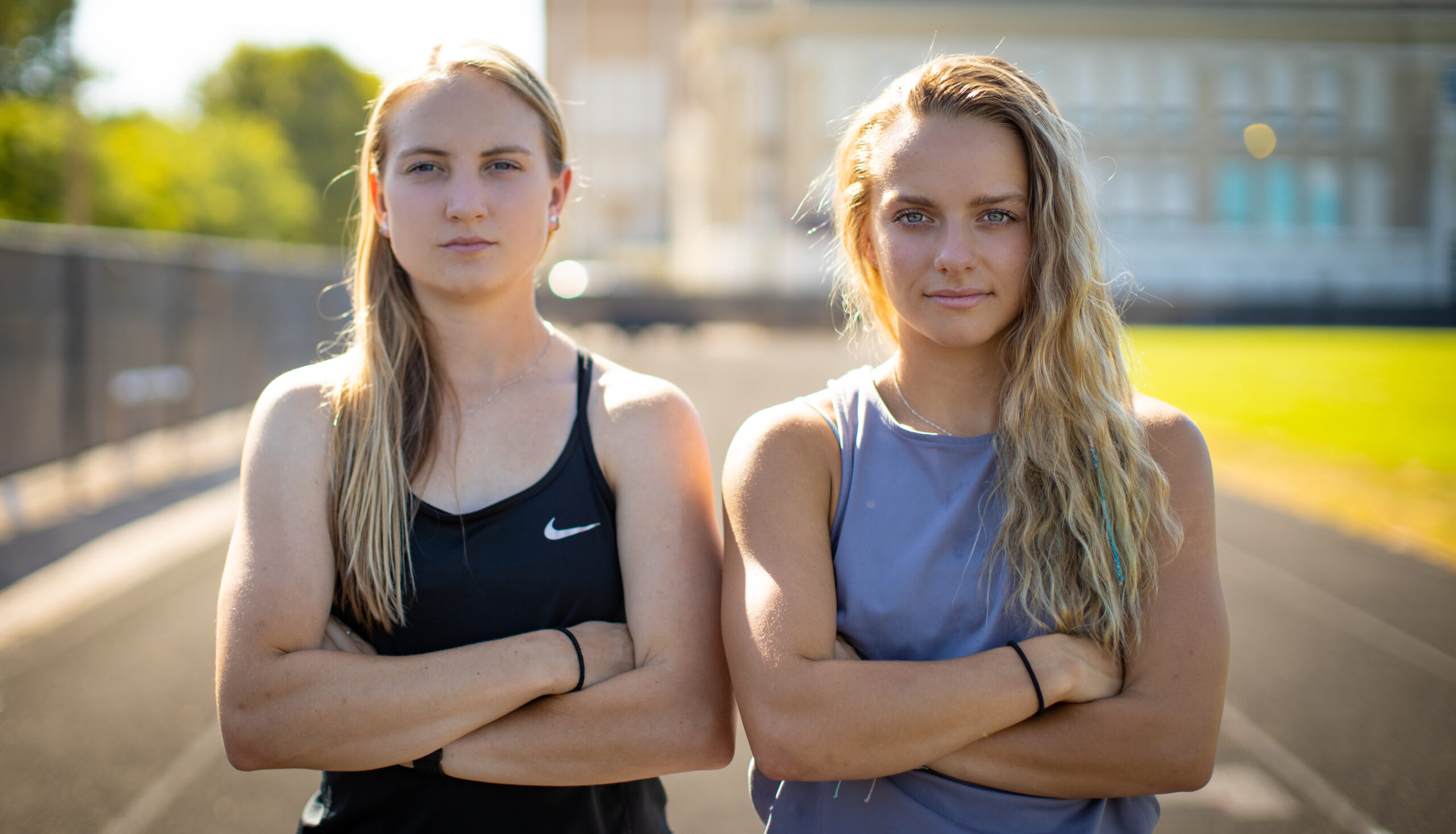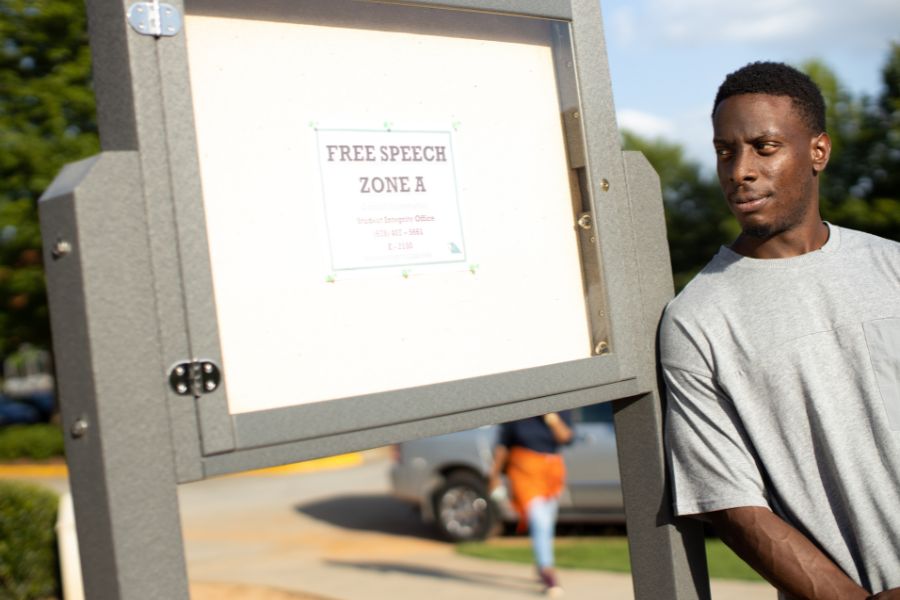
Madison and Mary Kate love to run and trained for years to compete. Both earned the opportunity to run at the collegiate level—a chance to test their discipline and showcase their abilities. But that opportunity was undermined when they were forced to compete against a male athlete who identifies as female.
Madison and Mary Kate experienced firsthand the unfairness of men competing against women. So, when they heard about Idaho’s Fairness in Women’s Sports Act, they were excited. They knew this legislation would protect female athletes, and when the law was challenged, they knew they had to speak up.
Meet Madison and Mary Kate

Madison Kenyon and Mary Kate Marshall are former collegiate athletes who ran track and cross country for Idaho State University. Both received scholarships to run track.
Running was Madison’s happy place. But things changed when she ran at the collegiate level. During a collegiate race her freshman year, she was forced to compete against a male and lost. She continued to face this male in multiple competitions and continued to lose.
Just like Madison, Mary Kate had invested years of effort into becoming the runner she was. She felt a thrill when she finished a race. But that was swept away when she and her teammates were displaced by a male athlete. During her first college cross-country race, Mary Kate also raced against a biological male and lost.
When Mary Kate lost, she felt different about losing to a male than losing to another woman, and rightly so. When she lost to a man, she said, “it [felt] completely different … It’s deflating,” because no matter how hard she tried, her “hard work and effort will not matter” when competing against a male who has natural biological advantages.
Upon losing to the male athlete, Madison echoed that she felt “frustrated and defeated.”
The biological differences between men and women are too large to ignore, and Madison and Mary Kate have experienced that first-hand. Madison has said that women can work against the clock, against odds, and against tough teams, but women cannot beat biological differences. Men are generally bigger, faster, and stronger than females. They have larger hearts and lungs, denser bones, and stronger muscles. It is how God made them, and these characteristics are ingrained in their bodies. Even when these male athletes take drugs to suppress their testosterone, no amount can undo all those advantages.
Madison and Mary Kate know that when they run against women, they have a fair chance at placements and scholarships. And when they compete on a fair playing field, that environment is conducive to hard work, discipline, time management, and teamwork since they can see their work pay off. But when they run against men, their motivation is zapped, and they are discouraged because it is no longer fair. They know the male will almost certainly win.
Idaho Steps Up to Protect Women’s Sports

Alliance Defending Freedom helped draft Idaho’s Fairness in Women’s Sports Act to protect female athletes’ safety, privacy, and athletic opportunities. The legislation passed in March 2020 and was the first act of its kind in the United States.
Idaho’s Fairness in Women’s Sports Act protects opportunities for women and girls. Anyone can play on teams that match their biological sex or play on a co-ed team. This preserves equal athletic opportunities for all while ensuring that only biological females can compete on teams designated for women and girls. This helps keep sports fair for women. Under the act, every athlete has equal opportunities to compete and thus to win, earn scholarships, and develop skills that these athletes will use for the rest of their lives.
But the American Civil Liberties Union challenged Idaho’s Fairness in Women’s Sports Act in a case known as Little v. Hecox. The ACLU advocates for men being able to compete against women, which would crumble the equal opportunities Idaho’s act protects.
Madison and Mary Kate found out about Idaho’s Fairness in Women’s Sports Act while they were in college. They see in it a chance to restore fairness and the joy of competition. They decided to take a stand to support it, because they knew what competing against and losing to a male was like. They’re raising their voices not just for themselves, but for every young woman who deserves a level playing field—an opportunity that they and their teammates were denied.
Preserving Opportunities for Women and Girls

For decades, legislation has acknowledged differences between men and women and has aimed to protect women. For example, Title IX was passed in 1972 to ensure equal opportunities for women in education and later paved the way for the expansion of women’s sports.
Similarly, Idaho’s Fairness in Women’s Sports Act explicitly requires schools and colleges to designate sports teams as either male, female, or co-ed and prohibits males from joining female teams. This means that only women can compete in women’s sports. With this law, fairness in women’s sports is preserved. Without it, opportunities are taken from women.
When Madison and Mary Kate competed against male athletes, they lost placements, became unmotivated and demoralized, and saw their deserving teammates lose unfairly. They do not want other girls and women to experience what they did. That is why these two runners support Idaho’s Fairness in Women’s Sports Act.
Going from the Track to the Court

Madison and Mary Kate intervened in Little v. Hecox because the case is about a problem they have lived through. “Female athletes should have the same opportunity as male athletes to enjoy fair competition and experience the thrill of victory,” said Madison.
Alliance Defending Freedom has supported Madison and Mary Kate since their request to intervene. In August 2020, the United States District Court for the District of Idaho permitted Madison and Mary Kate to intervene. The women received unfavorable rulings from the federal district court and from the U.S. Court of Appeals for the 9th Circuit.
Madison and Mary Kate appealed the case to the U.S. Supreme Court, and the Court agreed to hear their case alongside another ADF case, State of West Virginia v. B.P.J.. In that case, ADF client Lainey Armistead, a former collegiate soccer player, intervened to defend West Virginia’s Save Women’s Sports Act. ADF is also serving as co-counsel alongside West Virginia Attorney General JB McCuskey to defend the state’s law.
Help defend female athletes!

ADF is supporting these brave women in the Supreme Court at no cost to them. They get to stand for the truth without worrying about the financial burden thanks to your generous support.
Your gift today helps us defend Madison, Mary Kate, and the right of all female athletes to a fair playing field. Will you give today and take a stand for truth?




